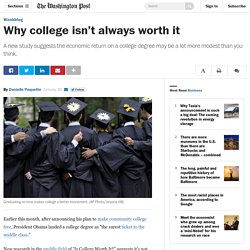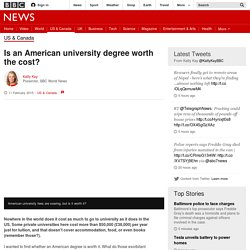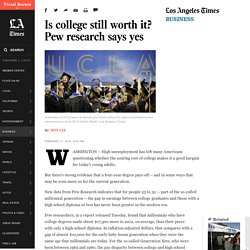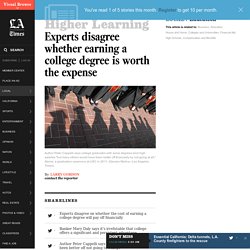

A College Degree Is The New High School Diploma. What Does A College Degree Mean Now? Why college isn’t always worth it. Graduating on time makes college a better investment.

(AP Photo/Jessica Hill) Earlier this month, after announcing his plan to make community college free, President Obama lauded a college degree as "the surest ticket to the middle class. " New research in the prolific field of “Is College Worth It?” Suggests it’s not that simple. “‘Ticket’ implies a college degree is something you can just cash in,” said Alan Benson, assistant business professor at the University of Minnesota. Benson, along with M.I.T.’s Frank Levy and business analyst Raimundo Esteva, co-authored a new paper, released this week, examining the value of public university options in California. Is an American university degree worth the cost? - BBC News. Nowhere in the world does it cost as much to go to university as it does in the US.

Some private universities here cost more than $50,000 (£38,000) per year just for tuition, and that doesn't cover accommodation, food, or even books (remember those?). I wanted to find whether an American degree is worth it. What do those exorbitant fees actually buy you? Right near the BBC bureau in Washington, DC, is one of the more expensive universities in the country - George Washington University. Under its former President Stephen Trachtenberg, prices at GW, as it's known here, have more than doubled over the course of the past few decades.
Trachtenberg invested in fancy dormitories, upmarket sports facilities and state-of-the-art classrooms in a deliberate strategy to make the school more appealing. He has no regrets about the massive inflation in tuition costs because it all leads to better jobs. Is College Worth It? Clearly, New Data Say. Some newly minted college graduates struggle to find work.

Others accept jobs for which they feel overqualified. Is college still worth it? Pew research says yes. WASHINGTON -- High unemployment has left many Americans questioning whether the soaring cost of college makes it a good bargain for today's young adults.

But there's strong evidence that a four-year degree pays off -- and in some ways that may be even more so for the current generation. New data from Pew Research indicates that for people 25 to 32 -- part of the so-called millennial generation -- the gap in earnings between college graduates and those with a high school diploma or less has never been greater in the modern era. Pew researchers, in a report released Tuesday, found that millennials who have college degrees made about $17,500 more in 2012, on average, than their peers with only a high-school diploma.
In inflation-adjusted dollars, that compares with a gap of almost $10,000 for the early baby boom generation when they were the same age that millennials are today. As the Pew report notes: "Young college graduates are having more difficulty landing work than earlier cohorts. The Great Debate: Is College Still Worth It? Do a simple Google News search on "higher education" and chances are you'll get a lot of hits -- stories about how expensive it is, how much debt students are accumulating, whether college graduates are faring any better in tough economic times than anyone else, whether a college education really translates into a better future.

Cumulatively, They Beg the Question, "Is a College Education Worth It? " Recent poll results obtained by the American Association of State Colleges and Universities (AASCU) shed some light on what Americans think about the value of a college education. The data shows the public is split on the question, with college graduates more than twice as likely to say, "Yes, it's worth it," than non-college graduates (62 to 30 percent, respectively).
Differences along racial and gender lines were also evident throughout the survey results. College degree is still worth the (very considerable) cost. With college costs soaring and new graduates struggling to land jobs, is higher education still worth the money?

Yes, according to an analysis by one recent college graduate who has studied the issue carefully. Experts disagree whether earning a college degree is worth the expense. Many high school seniors and their parents are in the throes of deciding which college to attend and figuring out how to pay for it.

The biggest question for those in the freshman applicant pool is where to enroll, not whether to go at all. Yet behind those family-by-family discussions is a larger economic debate: Does it make financial sense for such a large swath of American society to attend college in the first place? No one questions that college can be a life-changing experience intellectually and socially. But in a recent flurry of books and studies, economists and other experts focus on whether lifelong earnings are boosted enough by a diploma to make all the tuition costs and student debt worthwhile. And in a controversial challenge, a Silicon Valley businessman is offering coveted subsidies to bright young people who drop out or forego college to chase dreams of high-tech inventions and entrepreneurship. Education Is Worth the Investment There is no greater financial investment in one's future than a college degree.

While this viewpoint has its critics, the reality is the value of a degree has never been greater. Despite public questions about a degree's worth, the pay gap between college graduates and those without a degree reached a high in 2013, even with the slow recovery from the most severe recession in seventy-five years. According to new data, based on an analysis of Labor Department statistics by the Economic Policy Institute, Americans with four-year college degrees are not only equipped for a fulfilling adult and professional life but made 98 percent more an hour on average than those without a degree.
And, the wage gap is only increasing, up from 89 percent five years ago, 85 percent a decade earlier, and 64 percent in the early 1980s. Liberal arts graduates are not excluded from this reality. Students nationwide are keeping this in mind, and making smart financial choices. Value of College Education. Is a College Degree Still Worth It? In the United States, college is a right of passage.

In 2010, recent college graduates left school owing an average of $25,250 in student loans--the highest amount ever. Frustration with the economy and high unemployment rates is consistently shaping public opinion as college degrees, traditionally thought of as safeguards against unemployment, no longer guarantee gainful positions. According to the College Board, going to college costs between three and four times as much as it did 20 years ago. About a year ago, the nation’s cumulative student debt surpassed credit card debt for the first time, and it could grow to $1 trillion by the end of this year. While college-educated people do stand a better chance of landing a job than those who don’t go to secondary school, the time it takes to pay back the money laid out for a degree is growing, causing many to question the efficacy of attending college. Money isn’t the only issue, though.